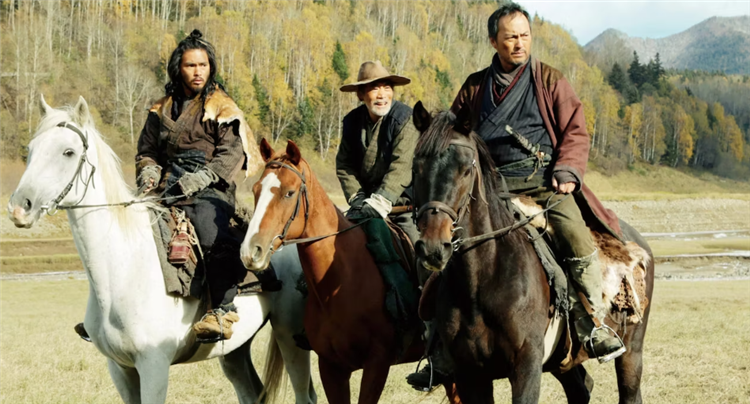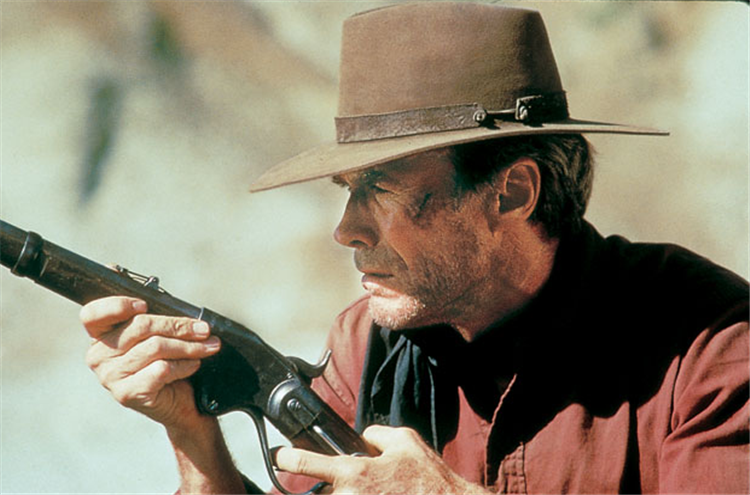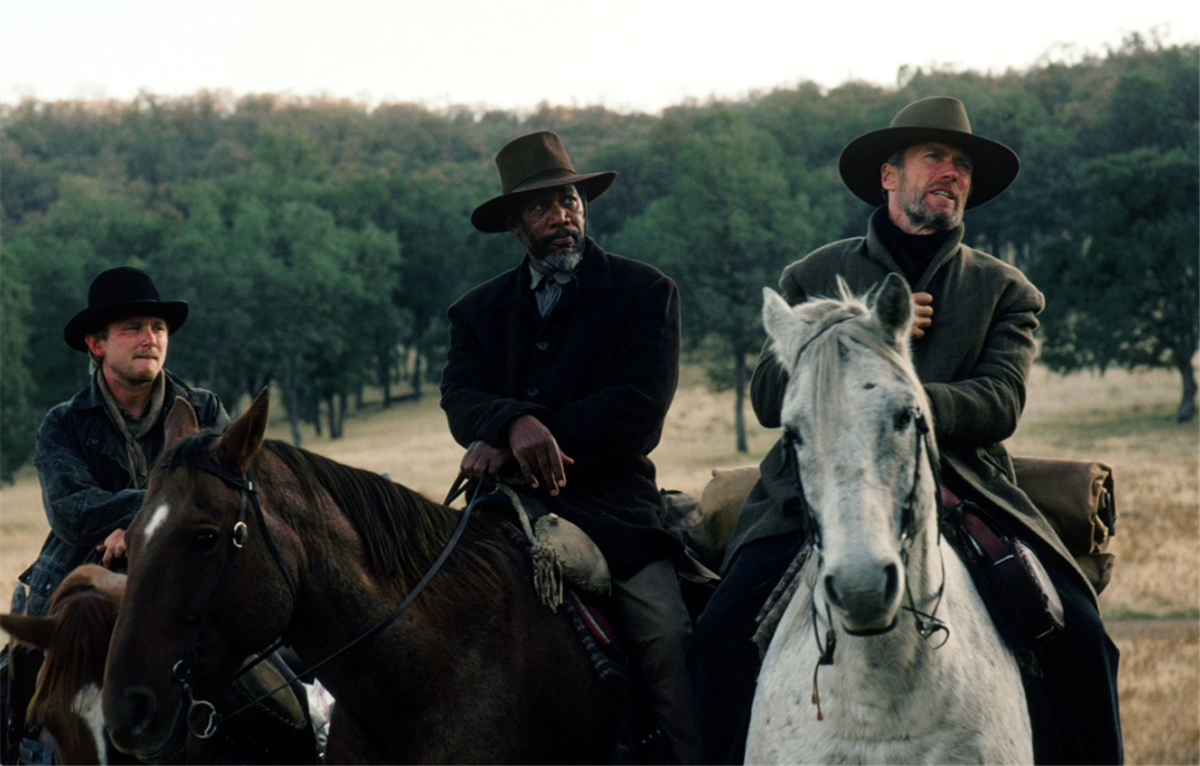There have been a lot of things said about the magnificence of Clint Eastwood’s Unforgiven. Undoubtedly one of the finest Westerns in cinematic history, its influence has been so far-reaching that it gave birth to a Japanese remake in 2013 starring Ken Watanabe. Directed by Lee Sang-il, the jidaigeki reconstruction takes the spirit of the Eastwood flick and transforms it into a gripping and bloody samurai epic. This remake is bloodier, more fleshed out, and it explores the waters which the Western did not test. The result is quite a cinematic rarity. There is a remarkable disdain for pictures that attempt to exploit the success of the original creation, but this one does not deserve such wrath from moviegoers. The Unforgiven remake is a commendable effort, bolstered by the purity of Japanese filmmaking and the unwavering spirit of the warrior within.
What Happens in the ‘Unforgiven’ Remake?
During the start of the Meiji period, a former samurai under the Edo Shogunate named Jubei (Ken Watanabe) flees to the woods. He is part of a bygone era, and begins life in the hills as a poor farmer, along with his two children. His wife passed away three years ago, and they are barely making ends meet. One day, Kingo Baba (Akira Emoto), one of his former compatriots, visits him at his home. Baba is after a bounty – two brothers who scratched up the face of a sex worker in Hokkaido – and asks Jubei to join in. Desperate to give his children a new lease on life, he reluctantly accepts the offer and joins Baba, but not before asking permission from his wife’s Ainu father. As he departs with Baba, a boisterous Ainu hunter named Goro Sawada (Yuya Yagira) joins in on the fray. He claims to have killed five men and wants to be a part of the group. Seeing his value, the pair allow Goro to contribute to the mission, and march into Hokkaido.
However, another former samurai in Masaharu Kitaoji (Jun Kunimura) has already arrived at the scene. Unfortunately, he meets the local police commander Ichizo Oishi (Kōichi Satō), himself a former samurai. He enforces a strict no guns and no swords policy. With a plethora of guns surrounding him, Kitaoji surrenders his weapons and gets a resounding beating from Sato. The following day, he is sent back to the edge of town, with his biographer leaving him behind. Jubei, who falls ill upon arriving in the town in the midst of heavy rain, gets the same treatment from Sato, while Baba and Goro escape. He musters up the strength to recover, regroups with his compatriots, and kills their first target. Baba admits that his killing days are behind him, and he leaves the mission to Jubei and Goro. Despite the change of heart, Sato finds Baba and beats him to death. After the killing of the second target, Goro confesses that it was his first time to kill anybody. Jubei, incensed at the thought of his dead friend, takes a swig of alcohol and rushes to the town. He kills everyone and burns the bar, before disappearing into the snowy depths. Goro and Natsume (Shioli Kutsuna) bring the reward to his children and prays that Jubei comes back.
How Is the ‘Unforgiven’ Remake Different from the Original Western?

From a narrative standpoint, it would be safe to say that the two Unforgiven films are essentially the same thing. They both tell the story of a man who has nothing to lose and wants to go on one last job to give their respective children a better life. However, what makes the remake so remarkable is its effort to bring something new to the table. It isn’t a mere shot-for-shot recreation of the original. Rather, it begins to explore the unexplored bits of the Clint Eastwood movie. For instance, there is a bit of exposition regarding Jubei’s past, compared to the mystique of William Munny, whose affairs are merely referred to in his reputation. In this film’s opening scene, we see a glimpse of what the aptly named Jubei “The Killer” is capable of. He is a prolific assassin and inherently provides viewers with two sides of the Munny mythos. Does it make it better? It would all boil down to personal preference of two equally brilliant characterizations: one of mystery, and one whose power is already visually alluded to.
Moreover, this remake dives more into the friendship of the two main characters. Clint Eastwood’s Unforgiven has William Munny and Ned Logan’s partnership as one of a subtle underst anding. Ned does not mince words with his partner, and Munny becomes the emotional center of their dynamic. In the remake, both Jubei and Baba share explicit thoughts on what they are about to do. Baba mentions that he worked as a coal miner after the war, and once they get the reward money, he knows where to find loads of coal to make them both rich. However, after killing the first target, Baba confesses that the coal story is a fabrication, and he apologizes for bringing Jubei into this whole operation. Once again, two different interpretations of a similar objective but with equally compelling approaches. Despite these parallel cinematic frames, it is in the remake’s ending where it completely shakes off the chains and becomes its own cultural product.
In addition, the remake also deals with a concept that seemed to be alien from the original, which is a discussion on race. Goro is an Ainu, an indigenous race from Japan with a completely different language and culture, and their people have been on the receiving end of discrimination for the longest time. It becomes one of the central aspects of Goro’s intention of joining the two killers, as well as the picture’s development. He mentions that this was his chance to be someone, rather than just be a person who is regularly treated like a wild animal. Jubei is very familiar with this. His late wife was Ainu after all, and his final order to the biographer to not mention anything about Goro is very telling. If the government knew that an Ainu took part in the killings, they will begin to persecute all of them. Jubei might not be able to save himself, but at least he did his part in safeguarding the indigenous tribe from suffering more than they regularly do. This adds an empowering spin to the film, politically speaking. In the end, the sight of Goro starting over his life with Natsume is a comforting visual.
The ‘Unforgiven’ Remake’s Ending Is Bloodier Than the Original

The ending of Clint Eastwood’s Unforgiven employed a “less is more” approach, with Munny swiftly disposing of his opponents, while they fail to leave a mark on him. More than just the signature Clint Eastwood comeback, this poetic conclusion brings the entire story of the Western full circle. He was harmed before, beaten to a bloody pulp by Little Bill, but when he came back to his own, it turned out that no one could really hold a candle to his abilities. Munny then comes out and tells everyone in the town that no one should harm any more of the sex workers, or he will come back and kill every single one of them, all while the American flag is in the background. It offers a critique on the violent history of America, and how morally destitute the wild west really is.
The remake employs pretty much the same spirit but transforms it into a bloody confrontation characteristic of its samurai epic Pneuma. Jubei enters, kills the bar owner and subsequently Oishi, and engages in a brutal sword fight with the remaining forces. He gets wounded, but his inner killer aids him to annihilate the opposition. Afterward, Jubei does not return to his children after vanquishing all of his foes. Instead, he becomes the Japanese equivalent of a cowboy riding into the sunset. He is a former samurai, who has broken his vow of leaving violence alone, walking through the freezing blizzard. The sheer brutality of the remake’s ending provides a more impassioned and successful visual. The sword-wielding action is the equivalent of the final duel, just presented through a different lens. They are one and the same, both becoming the instance where Munny and Jubei realize that their sins will ultimately remain unforgiven.
Giving the ‘Unforgiven’ Remake Its Due Credit
The Unforgiven remake is one of the better cinematic recreations in recent memory. The movie received great acclaim during its airing at the Venice Film Festival in 2013, and most importantly, the reported approval of Clint Eastwood himself. It also parallels one of the most important moments in Clint Eastwood’s career. After all, his big break came in A Fistful of Dollars a Yojimbo remake. Now, his directorial influence and oeuvre are being honored by a Japanese film about his most acclaimed work.
Rather than merely being considered a remake, Lee Sang-il’s Unforgiven should be judged based on its own merits. If given the opportunity to be assessed as its own piece, it is a beautifully shot picture that brings the soul of Japan and its history to the silver screen. It has its own unique artistic value and is a must-watch for every avid moviegoer out there.
